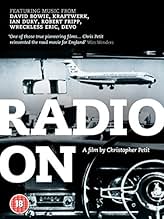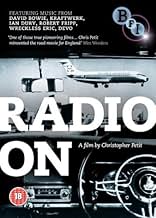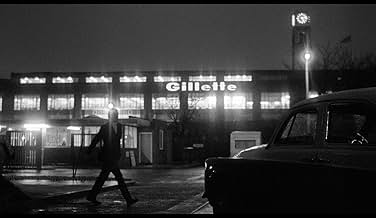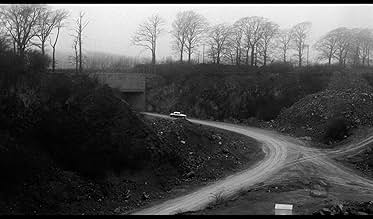Radio On
- 1979
- 1 Std. 44 Min.
IMDb-BEWERTUNG
6,5/10
1289
IHRE BEWERTUNG
Füge eine Handlung in deiner Sprache hinzuIn 1970s Britain, a man drives from London to Bristol to investigate his brother's death, and the purpose of his trip is offset by his encounters with a series of odd people.In 1970s Britain, a man drives from London to Bristol to investigate his brother's death, and the purpose of his trip is offset by his encounters with a series of odd people.In 1970s Britain, a man drives from London to Bristol to investigate his brother's death, and the purpose of his trip is offset by his encounters with a series of odd people.
- Auszeichnungen
- 1 Gewinn & 1 Nominierung insgesamt
Empfohlene Bewertungen
The road movie is among my favorite genres, and "Radio On" ranks with the best of them. Co-produced by Wim Wenders, the master of the existential road movie (whose production company is called "Road Movies," no less), it was made in 1979 by Christopher Petit, who had been a film critic for London's "Time Out" and received funding from Wenders and the British Film Institute to make this film. One very clearly sees an admiration here for Wenders' road trilogy, particularly "Kings of the Road," but "Radio On" extracts the essence of Wenders' style and the soul of the road movie and forms a sort of concentrate from it. This is a meditation *on* the road movie, but on lots of other things, too.
In a film with very long shots and many lonesome scenes with no dialogue, nothing feels superfluous. Lengthy, lingering shots from behind the driver's seat of a moving car with music from Kraftwerk's "Radio-Activity" could very well come across as empty, but in this movie, they don't. Each shot is given ample time to sink in, and they do. Petit has made a movie, rich in its sparseness, that depicts alienation and inward-seeking as effectively as any Wenders film, and like Wenders, there are echoes of Edward Hopper's paintings here in the evening streets lit by streetlights, and in the beautiful moment where we see two characters, British man and German woman, each standing behind separate hotel room windows, staring out pensively as we pass by from a motorway bridge.
The man in the window is Robert, the film's central character, and he is traveling from Camden to Bristol to seek information about the death of his brother. That his name is Robert will likely slip the viewer's mind, as what's important about "Radio On" and the road movies of Wim Wenders is that the central characters are not too sharply drawn, and only a vague set of circumstances are established to give their journey the semblance of purpose. This way, the characters are ciphers, blank slates, and we take this journey with them by inhabiting them, by projecting our own sensibilities onto them, and to that extent, films like "Kings of the Road," "Radio On," and Wenders' later and similar "Until the End of the World" are as purging as a road trip itself.
All of the characters in "Radio On" look like they are brooding, but they don't talk about why, they simply brood and they keep moving while doing so.
Angst and alienation are both factors, but so is the fact that the world is changing. From a small, wintry spot on the globe, change is just around the corner and the characters feel it in their bones, if not yet in their heads.
The energy of the music of David Bowie, Wreckless Eric, Devo and others penetrates the meditative pace and makes these imminent changes palpable in the film's ambiance, or more accurately, in its aura. The movie's calm is an eerie and temporary one, like when the shoreline recedes prior to a tidal wave.
As the title would suggest, the music is one of the principal elements here.
I will indelibly associate Bowie's "Heroes" and Wreckless Eric's "Whole Wide World" with this film. Here, they are like the sun of a new decade rising to melt the snow of the 1970s. Or like a curtain call for an age.
And there is genuine poetry in the dialogue.
The German tourist explains to Robert that her friend hates men. Robert observes, "There's no word for that in English. The only word is for a man who hates women," and we understand that there is sadness in this fact, even if we can't articulate why.
The movie is beautifully conceived and structured, and it is structured both loosely and mindfully. It moves slowly, but it's spontaneous. Sting appears briefly as a filling station attendant, in a wonderful scene where he talks about the death of Eddie Cochran, strums his guitar, and sings "Three Steps to Heaven" from the back of his camper. The film ends as we hear Kraftwerk's "Ohm Sweet Ohm" beaming out from a car radio on the edge of a cliff, and home sweet home is precisely nowhere. This movie is quiet, slow, low-key, but it gets under the skin and is ultimately quite stirring.
In a film with very long shots and many lonesome scenes with no dialogue, nothing feels superfluous. Lengthy, lingering shots from behind the driver's seat of a moving car with music from Kraftwerk's "Radio-Activity" could very well come across as empty, but in this movie, they don't. Each shot is given ample time to sink in, and they do. Petit has made a movie, rich in its sparseness, that depicts alienation and inward-seeking as effectively as any Wenders film, and like Wenders, there are echoes of Edward Hopper's paintings here in the evening streets lit by streetlights, and in the beautiful moment where we see two characters, British man and German woman, each standing behind separate hotel room windows, staring out pensively as we pass by from a motorway bridge.
The man in the window is Robert, the film's central character, and he is traveling from Camden to Bristol to seek information about the death of his brother. That his name is Robert will likely slip the viewer's mind, as what's important about "Radio On" and the road movies of Wim Wenders is that the central characters are not too sharply drawn, and only a vague set of circumstances are established to give their journey the semblance of purpose. This way, the characters are ciphers, blank slates, and we take this journey with them by inhabiting them, by projecting our own sensibilities onto them, and to that extent, films like "Kings of the Road," "Radio On," and Wenders' later and similar "Until the End of the World" are as purging as a road trip itself.
All of the characters in "Radio On" look like they are brooding, but they don't talk about why, they simply brood and they keep moving while doing so.
Angst and alienation are both factors, but so is the fact that the world is changing. From a small, wintry spot on the globe, change is just around the corner and the characters feel it in their bones, if not yet in their heads.
The energy of the music of David Bowie, Wreckless Eric, Devo and others penetrates the meditative pace and makes these imminent changes palpable in the film's ambiance, or more accurately, in its aura. The movie's calm is an eerie and temporary one, like when the shoreline recedes prior to a tidal wave.
As the title would suggest, the music is one of the principal elements here.
I will indelibly associate Bowie's "Heroes" and Wreckless Eric's "Whole Wide World" with this film. Here, they are like the sun of a new decade rising to melt the snow of the 1970s. Or like a curtain call for an age.
And there is genuine poetry in the dialogue.
The German tourist explains to Robert that her friend hates men. Robert observes, "There's no word for that in English. The only word is for a man who hates women," and we understand that there is sadness in this fact, even if we can't articulate why.
The movie is beautifully conceived and structured, and it is structured both loosely and mindfully. It moves slowly, but it's spontaneous. Sting appears briefly as a filling station attendant, in a wonderful scene where he talks about the death of Eddie Cochran, strums his guitar, and sings "Three Steps to Heaven" from the back of his camper. The film ends as we hear Kraftwerk's "Ohm Sweet Ohm" beaming out from a car radio on the edge of a cliff, and home sweet home is precisely nowhere. This movie is quiet, slow, low-key, but it gets under the skin and is ultimately quite stirring.
It comes as no surprise to see Wim Wenders name in the credits. As in most road movies much of this simply consists of a loner staring into space. But former critic Christopher Petit has taken the message "We are the children of Fritz Lang and Werner von Braun" to heart.
As benefits a film that's half-German half the dialogue is in German and the credits are bi-lingual (we even hear David Bowie singing 'We Can Be Heroes' in German), and Petit employs black & white photography to transform North London into an alien environment combining 'Metropolis' and 'Alphaville' (complete with a sinister voice like Alpha-60 emanating from a radio).
Like the earlier films by Lang and Godard it all seemed very modern at the time, but the references to Northern Ireland like Godard's to Algeria and a cameo by Sting make it today look just as much of a period piece as the earlier film. The charmingly archaic computer game seen in a pub is also evocative of an era long ago.
As benefits a film that's half-German half the dialogue is in German and the credits are bi-lingual (we even hear David Bowie singing 'We Can Be Heroes' in German), and Petit employs black & white photography to transform North London into an alien environment combining 'Metropolis' and 'Alphaville' (complete with a sinister voice like Alpha-60 emanating from a radio).
Like the earlier films by Lang and Godard it all seemed very modern at the time, but the references to Northern Ireland like Godard's to Algeria and a cameo by Sting make it today look just as much of a period piece as the earlier film. The charmingly archaic computer game seen in a pub is also evocative of an era long ago.
Former Time Out critic, Christopher Petit's directorial debut, Radio On, shows its European credentials well. I say this for a couple of reasons. For one, like the French New Wave participants, Petit began as a film critic, and the sparing nature of this existential road movie, was self- consciously attempting to move British cinema towards a European style. Secondly, and far more telling, is the influence and participation of the New German Cinema of the 1970's. Whilst interviewing Wim Wenders, the subject of Petit's own screenplay arose, and Wenders was impressed. Therefore, Wenders became associate producer, and also lent the use of his cinematographer, Martin Schafer.
Beautifully shot in monochrome, the black and white imagery displays its artful intentions. We follow Robert (David Beames) as he drives from London to Bristol, after being informed that his brother has committed suicide. On his journey, he encounters several unhinged British citizens, including a Glaswegian squaddie with anger management issues, as well as meeting Sting at a petrol station, who seems to be obsessed with Eddie Cochran. Not much really happens in the film, but the most significant (at least the longest) "relationship" is with a German woman, Ingrid (Lisa Kreuzer - who was in Wenders' Alice in the Cities (1974 - Review #96)), who is searching for her missing daughter named Alice (a possible reference to the aforementioned German film.
This is a bleak representation of 1970's Britain. Not a hard task in itself (you could have pointed a camera anywhere in '70's Britain, and it would have been depressing). But what was fundamental to Petit's intentions, was actually a comment on the decline of British cinema. The main output of British cinema was within the prurient genre of the repressed "sex comedies" such as the on-going Carry On.. films, or the equally lamentable Confessions... series with Robin Askwith. When there was any serious attempt at British cinema, they were barely seen. Petit, felt that the Americanisation of our cinema's and the fact that our national cinema was laughable, was decreasing our cultural identity. Radio On is an attempt to move our cinema towards a more European, existential path, and with a more political consciousness.
www.the-wrath-of-blog.blogspot.com
Beautifully shot in monochrome, the black and white imagery displays its artful intentions. We follow Robert (David Beames) as he drives from London to Bristol, after being informed that his brother has committed suicide. On his journey, he encounters several unhinged British citizens, including a Glaswegian squaddie with anger management issues, as well as meeting Sting at a petrol station, who seems to be obsessed with Eddie Cochran. Not much really happens in the film, but the most significant (at least the longest) "relationship" is with a German woman, Ingrid (Lisa Kreuzer - who was in Wenders' Alice in the Cities (1974 - Review #96)), who is searching for her missing daughter named Alice (a possible reference to the aforementioned German film.
This is a bleak representation of 1970's Britain. Not a hard task in itself (you could have pointed a camera anywhere in '70's Britain, and it would have been depressing). But what was fundamental to Petit's intentions, was actually a comment on the decline of British cinema. The main output of British cinema was within the prurient genre of the repressed "sex comedies" such as the on-going Carry On.. films, or the equally lamentable Confessions... series with Robin Askwith. When there was any serious attempt at British cinema, they were barely seen. Petit, felt that the Americanisation of our cinema's and the fact that our national cinema was laughable, was decreasing our cultural identity. Radio On is an attempt to move our cinema towards a more European, existential path, and with a more political consciousness.
www.the-wrath-of-blog.blogspot.com
Opening scene: like a badly lit YouTube video with camera tracking around a dingy flat in the dark.
A lot of dinge. Silences devoid of talking but staring from back of head off out into alienated nowheres.
Perpetual gloom is hungover every scene. This is England of 1979. Looking as bleak and despondent as I remember it. Thatcher the milk-snatcher had just come to power.
Not just dark and dim, but dull the first time i saw it. The plot is minimal and pointless (i.e beside the point) Concerned more with observational detachment than motivational character development. It's got a morose London Dj driving his Rover past monolithic tower-blocks out towards the desolate west country. Listening to Kraftwerk tapes sent by dead brother.
Dj like an alienated mopey nobody passively drifts into and out of various encounters of estrangement with other alienated mopey no-bodies (Sting still tries to be Sting though as a solitary and subdued petrol attendant singing Eddie Cochran on guitar).
This is Wim Wenders country. The existential road movie switched from soul-less autobahn to empty A4. Wenders cinematographer (Martin Schafer) is doing all the b/w monochrome melancholy with the camera. Even got Liza Kreuzer from Alice in the Cities looking for her daughter Alice (from Alice in the Cities?). Maybe she's in Weston-Super-Mare. Lets go there.
This has become a cult film. Critics liked it because it tried to be different, i.e the same as their beloved Wim. A cool German art-house sensibility transplanted to 1970′s England. Makes it feel like a depressingly depressive place. Even more depressingly depressive than it is now.
A lot of dinge. Silences devoid of talking but staring from back of head off out into alienated nowheres.
Perpetual gloom is hungover every scene. This is England of 1979. Looking as bleak and despondent as I remember it. Thatcher the milk-snatcher had just come to power.
Not just dark and dim, but dull the first time i saw it. The plot is minimal and pointless (i.e beside the point) Concerned more with observational detachment than motivational character development. It's got a morose London Dj driving his Rover past monolithic tower-blocks out towards the desolate west country. Listening to Kraftwerk tapes sent by dead brother.
Dj like an alienated mopey nobody passively drifts into and out of various encounters of estrangement with other alienated mopey no-bodies (Sting still tries to be Sting though as a solitary and subdued petrol attendant singing Eddie Cochran on guitar).
This is Wim Wenders country. The existential road movie switched from soul-less autobahn to empty A4. Wenders cinematographer (Martin Schafer) is doing all the b/w monochrome melancholy with the camera. Even got Liza Kreuzer from Alice in the Cities looking for her daughter Alice (from Alice in the Cities?). Maybe she's in Weston-Super-Mare. Lets go there.
This has become a cult film. Critics liked it because it tried to be different, i.e the same as their beloved Wim. A cool German art-house sensibility transplanted to 1970′s England. Makes it feel like a depressingly depressive place. Even more depressingly depressive than it is now.
As enigmatic as its title, Chris Petit's debut film is interesting visually, but less so in other respects, particularly narrative drive and character depth. To be perfectly honest, it starts slowly and decelerates from there, with David Beames' disillusioned disc-jockey setting out to ostensibly look into the death (in his own bath) of his brother. Along the way he encounters obsessive individuals like an unhinged Scottish army deserter, an Eddie Cochran-obsessed garage attendant and a young German woman trying to track down her daughter.
More than likely the film is working at allegorical and symbolic levels I couldn't comprehend, although I did recognise the bleakness of the environment depicted here, having lived through the period as a young adult in Glasgow. I wasn't surprised to see Wim Wenders' name on the production credits, so terribly slow is the I hesitate to call it action, the longueurs broken most frequently by music from the contemporary post-industrial music scene, including tracks by Kraftwerk, Bowie and Fripp amongst others. In fact the music is so dominant at times, you might think the film is the visual accompaniment to its own soundtrack, rather than the other way round.
It's all very stilted and boring however. Some humour might have helped a bit or even some sort of dramatic climax, but I gave up on that hope quite early. As a snapshot of this country suffering economic hardship in a bleak post-industrial wasteland (no change there, then), I just about got Beames aimless and listless drifting as a metaphor for the frustrated youth of the time, distrusting authority, travelling without moving as the saying goes.
Eventually he literally moves to the edge as he ends up on the edge of a precipice, in actuality a disused quarry but by then I had tired of the film's general inaction, dull characterisations, flat dialogue and obscure locations. The camera lingers on and on long after a scene has ended, and what I presume are supposed to be meaningful silences are in the end just awkward pauses.
The Britain of the early Thatcher government was like this visually, grey, cold bleak and pretty hopeless. I'm not quite sure however what I was meant to derive from the main character's "journey", even if in truth he seemed to be on a road to nowhere. I could see cultural cross-references to the music of the day (The Specials "Ghost Town" from a year later would have fitted the soundtrack very well) and also the photography of Anton Corbijn (best known for his work with U2 and Depeche Mode), but as a bona-fide movie though, I didn't get its vaguely film-noir meets urban decay aspiration and might have wished I'd put on a few Bowie and Kraftwerk albums to pass the time instead.
More than likely the film is working at allegorical and symbolic levels I couldn't comprehend, although I did recognise the bleakness of the environment depicted here, having lived through the period as a young adult in Glasgow. I wasn't surprised to see Wim Wenders' name on the production credits, so terribly slow is the I hesitate to call it action, the longueurs broken most frequently by music from the contemporary post-industrial music scene, including tracks by Kraftwerk, Bowie and Fripp amongst others. In fact the music is so dominant at times, you might think the film is the visual accompaniment to its own soundtrack, rather than the other way round.
It's all very stilted and boring however. Some humour might have helped a bit or even some sort of dramatic climax, but I gave up on that hope quite early. As a snapshot of this country suffering economic hardship in a bleak post-industrial wasteland (no change there, then), I just about got Beames aimless and listless drifting as a metaphor for the frustrated youth of the time, distrusting authority, travelling without moving as the saying goes.
Eventually he literally moves to the edge as he ends up on the edge of a precipice, in actuality a disused quarry but by then I had tired of the film's general inaction, dull characterisations, flat dialogue and obscure locations. The camera lingers on and on long after a scene has ended, and what I presume are supposed to be meaningful silences are in the end just awkward pauses.
The Britain of the early Thatcher government was like this visually, grey, cold bleak and pretty hopeless. I'm not quite sure however what I was meant to derive from the main character's "journey", even if in truth he seemed to be on a road to nowhere. I could see cultural cross-references to the music of the day (The Specials "Ghost Town" from a year later would have fitted the soundtrack very well) and also the photography of Anton Corbijn (best known for his work with U2 and Depeche Mode), but as a bona-fide movie though, I didn't get its vaguely film-noir meets urban decay aspiration and might have wished I'd put on a few Bowie and Kraftwerk albums to pass the time instead.
Wusstest du schon
- WissenswertesIn Britain, this film had a limited release on the art-house circuit in 1980 in a double-bill with a famous film made half-a-century earlier, Luis Bunuel's "L'Age D'Or", which had only recently come off the censor's banned list. One critic remarked that this double-billing meant that he had had both his best and his worst cinema-going experience of 1980 on the same evening.
- VerbindungenFeatured in Radio On Remix (1998)
Top-Auswahl
Melde dich zum Bewerten an und greife auf die Watchlist für personalisierte Empfehlungen zu.
- How long is Radio On?Powered by Alexa
Details
- Erscheinungsdatum
- Herkunftsländer
- Sprachen
- Auch bekannt als
- Radio on
- Drehorte
- M4, London, England, Vereinigtes Königreich(6 High-rise Flats on Green Dragon Lane)
- Produktionsfirmen
- Weitere beteiligte Unternehmen bei IMDbPro anzeigen
- Laufzeit
- 1 Std. 44 Min.(104 min)
- Farbe
- Sound-Mix
- Seitenverhältnis
- 1.85 : 1
Zu dieser Seite beitragen
Bearbeitung vorschlagen oder fehlenden Inhalt hinzufügen



























